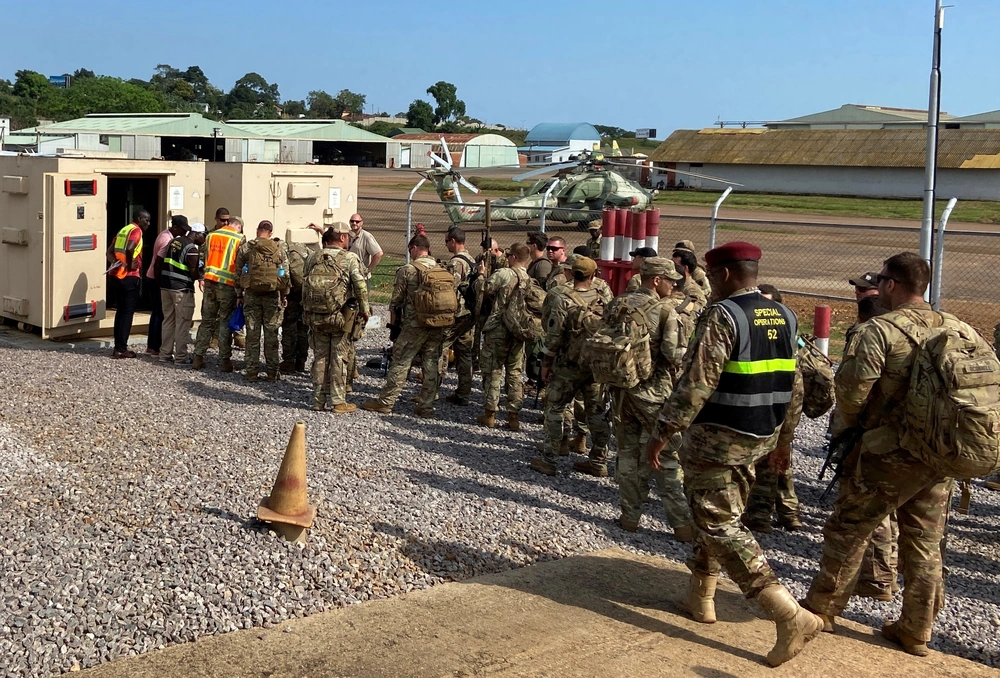Several cooperative security locations are scattered across multiple countries and locations on the continent of Africa. In place to serve as power projection platforms, CSLs can be used when the U.S. State Department needs assistance, or combatant commanders need additional capabilities during joint and allied operations.
Most of these CSLs operate in what’s considered a “warm” status until activation. It takes a total team effort to ensure they are validated and ready for activation when called upon, and the 405th Army Field Support Brigade’s Logistics Civil Augmentation Program-Africa is key to ensuring flawless execution.
Recently, CSL Entebbe in Uganda went from warm to hot during an activation validation mission. A LOGCAP execution team consisting of 405th AFSB LOGCAP-Africa Planner Justin Conner, an administrative contracting officer from the 414th Contracting Support Brigade, and the base operating support-integrator, or BOS-I, travelled to CSL Entebbe and assessed 13 activated services and CSL Entebbe’s overall readiness during the validation mission, Feb. 15-17.
Conner said LOGCAP-Africa’s main focus, in addition to translating the requiring activities’ base support needs into contracted requirements, is oversight and assessment of the contract itself.
“That means we’ll work closely with the BOS-I team and the contracting officer representative to track the contractor’s performance. If there’s any issues on the ground, we’ll work with the administrative contracting officer to make any needed modifications and try to resolve any issues with the contactor directly,” Conner said.
For the activation at CSL Entebbe – which could be used to assist the U.S. Embassy in Uganda during an extraction mission or another contingency operation, for example – the LOGCAP execution team understood that initial planning called for support to 42 personnel.
“But then kind of last minute – three or four days before activation – they said no, the EARF [East Africa Response Force] is going to be on site, and we need to be set up to support them, as well. They bumped it up to about 90, and ultimately 83 U.S. servicemembers [from the EARF and Combined Joint Task Force-Horn of Africa out of Camp Lemonnier, Djibouti] were serviced and accommodated,” Conner said.
Validating CSL Entebbe for current and future operations is extremely important, said Conner. At validation completion he said the support provided exceeded the requiring activities’ expectations, and further insights and ways to improve for future operations were identified.
“Overall, the activation I think went very well,” Conner said. “There were a few minor tweaks that needed to be made and minor improvements by the contractor, but overall the LOGCAP execution team was very satisfied with the results of the validation.”
The 405th AFSB provides and coordinates U.S. Army Material Command enablers in support of U.S. Army Africa and Europe through LOGCAP, the preferred source for base operations support and sustainment services. LOGCAP is the contracted capability of choice for the Army and multiple joint partners for emergent and contingency operations. Currently, the 405th AFSB’s LOGCAP program supports thousands of deployed U.S. forces in Europe and Africa with base life support and more. Dvids
East Africa
About IEA Media Ltd
Informer East Africa is a UK based diaspora Newspaper. It is a unique platform connecting East Africans at home and abroad through news dissemination. It is a forum to learn together, grow together and get entertained at the same time.
To advertise events or products, get in touch by info [at] informereastafrica [dot] com or call +447957636854.
If you have an issue or a story, get in touch with the editor through editor[at] informereastafrica [dot] com or call +447886544135.
We also accept donations from our supporters. Please click on "donate". Your donations will go along way in supporting the newspaper.
Our Offices
London, UK
+44 7886 544135
editor (@) informereastafrica.com
Slough, UK
+44 7957 636854
info (@) informereastafrica.com
Latest News
© Informer East Africa - IEA Media Ltd. Designed by InspireTheme.






